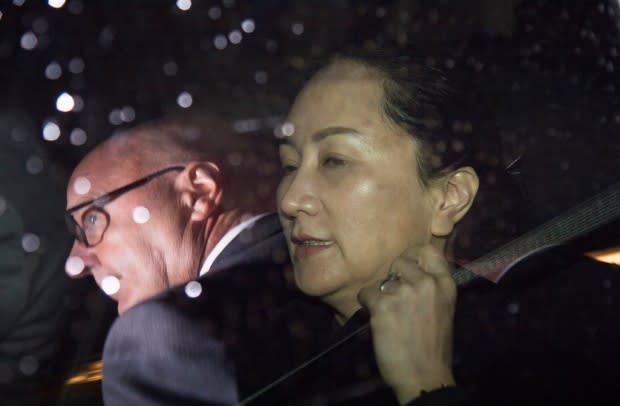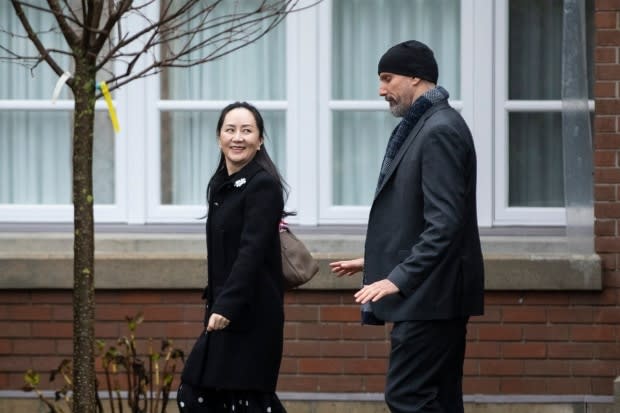Crown claims fraud 'at the heart' of case against Meng Wanzhou
A lawyer for Canada's attorney general told a B.C. Supreme Court judge Wednesday that the criminal case against Huawei executive Meng Wanzhou is a simple one of fraud.
In a concise and occasionally amusing presentation, Crown lawyer Robert Frater told Associate Chief Justice Heather Holmes she should steer clear of the defence's strict attempts to tie the case to sanctions law.
"Ours is not a complex theory of this case," Frater said. "Lying to a bank in order to get banking services that creates a risk of economic prejudice is fraud. Fraud — not sanctions violations — is at the heart of this case."
Judge's job not to stand up for Canadian sovereignty
Frater's arguments took a little under three hours, as opposed to the two days of arguments in which Meng's lawyers argued that the case against her doesn't satisfy the principle of "double criminality" needed for extradition.
Meng, 47, is accused of bank fraud over allegations that she lied to an HSBC executive in Hong Kong about Huawei's control of a subsidiary attempting to sell American computer equipment to an Iranian telecommunications company, putting the bank at risk of violating U.S. sanctions against Iran.

Meng's lawyers argued that her alleged conduct would not be criminal in Canada because Canada didn't have the same economic sanctions in place at the time U.S. prosecutors gave the authority to proceed with the extradition.
In doing so, they repeatedly noted that Canadians had chosen to go a different route than the U.S. when it came to business dealings with Iran and accused American prosecutors of trying to use Canada to enforce sanctions Ottawa has rejected.
But Frater told Holmes her job was not to stand up for Canadian sovereignty.
'I could sit down now'
The Crown lawyer took the judge through the central elements of fraud as they apply to Meng's alleged actions.
Frater argued HSBC allegedly risked prosecution, fines and loss of reputation by relying on Meng's assurances to make business decisions that put the bank at risk of violating the sanctions.

Frater also said the alleged conduct had all the elements necessary to satisfy a charge of fraud in Canada: deceit; deprivation of a person's economic interest; a causal link between the two; Meng's subjective knowledge of the lie; and the knowledge it could have caused loss.
The judge wouldn't have to think about sanctions, Frater said.
"End of story," he told Holmes. "I could sit down now."
But he didn't.
'Leave it to the minister'
Instead, Frater continued, offering Holmes another way of considering the facts of the case and the existence of the U.S. economic sanctions — one he said would still result in a decision to commit Meng for extradition.
In trying to determine double criminality, a judge is asked to pose a hypothetical question: What if this conduct had occurred in Canada?
Frater also accused the defence of trying to apply an "absolutist" lens to the question by insisting the lack of Canadian economic sanctions would inevitably mean Meng's alleged lie would be meaningless, because banks couldn't risk any loss from non-existent laws.

He gave examples of extradition cases where judges have considered the existence of foreign laws in order to understand the context around the case as a way of judging the "essence" of the conduct.
"In all of these cases, common sense prevails as opposed to absolute rules," Frater said.
The Crown lawyer also answered a question the judge asked Meng's defence lawyers about the possibility of prosecuting someone in Canada for lying over the phone to someone in a foreign country, as a means of fraud.
Frater said that would have to be a crime, otherwise, "it would make Canada the destination of choice for telemarketing fraudsters and other transnational criminals."
Holmes asked Frater about the broad nature of circumstances that can give rise to fraud, and what might happen if the context around a fraud involved a foreign legal situation, like sanctions, that Canadians find offensive.
It's the job of Canada's justice minister, not an extradition judge, to make that call, Frater said.
"The answer is leave it to the minister," he replied. "There are different roles to be played at each phase … you have a role that is limited to talking about whether the elements of the offence are satisfied."
Hearing to wrap Thursday
Frater finished his arguments by the end of the morning session. The defence is expected to make a short reply on Thursday morning and the matter will then be left with Holmes to decide.
If the requirement for double criminality is not met, Meng would be free. But if the Crown is successful, a hearing is scheduled for June in which the defence will argue that her rights were violated on her arrest.
If that hearing goes ahead, the defence will also argue that Meng is being used as a political pawn by U.S. President Donald Trump, who has said he would intervene in her case if it would help get a better trade deal with China.
Trump signed an initial trade deal with China last week, with no sign that he had heeded a suggestion from Prime Minister Justin Trudeau in December that any pact should deal with Meng and the two Canadians who were detained in China shortly after her arrest.
Entrepreneur Michael Spavor and former diplomat Michael Kovrig were later formally arrested and now face accusations of spying in China, where they are incarcerated without access to lawyers or family.
China has also cut off Canadian canola and meat imports in the past year, but lifted a ban on pork and beef in November.

 Yahoo Movies
Yahoo Movies 
